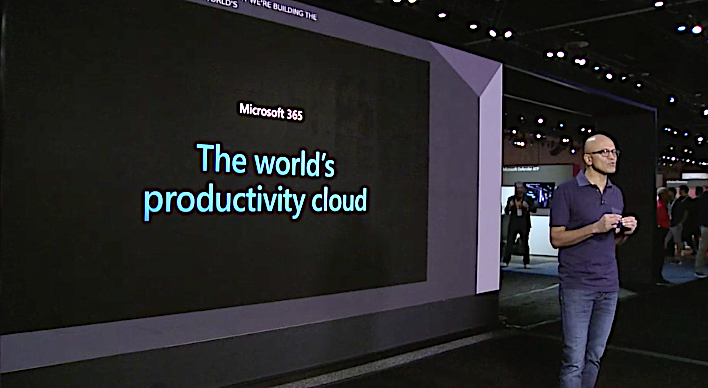 CLOUD
CLOUD
 CLOUD
CLOUD
 CLOUD
CLOUD
Microsoft Corp. opened its annual Ignite conference today in Orlando, Florida, by unveiling new developer tools and a slew of Office 365 features designed to help business users spend their time more efficiently.
Office 365, the subscription service that includes the likes of Outlook, Word and Excel, is part of Microsoft 365, which provides those Office services as well as other business tools. The additions join the cloud services the company introduced at the event for Azure and the Power Platform, where Microsoft Chief Executive Satya Nadella (pictured) laid out all the announcements.
Project Cortex is the first new service in Office 365 since the Microsoft Teams chat platform launched two years ago. It takes the different kinds of files scattered throughout a typical company, from documents to images, and organizes items into topics. Users can then search for these topics inside Microsoft applications instead of having to hunt down key pieces of information individually.
A sales representative writing a proposal in Word, for instance, could now use the application’s search bar to look up relevant materials. Project Cortex can surface Excel spreadsheets, Outlook emails, Microsoft Teams chat logs and images, among many other files. Some of the information shows up directly in the search results, while additional context is delivered in the form of pop-up cards that appear when the user hovers over items.

The iOS version of Outlook is receiving an integration with Microsoft’s Cortana that will allow the voice assistant to read out emails and schedule meetings. Starting next month, it will also gain the ability to produce daily briefings. If a user enables this option, Cortana will send them an email at the start of their work day with a list of upcoming meetings, relevant documents and follow-up remainders.
Excel is getting some artificial intelligence features as well. Instead of having to manually find information buried in spreadsheets, users can now perform searches using natural-language queries like “what are our most popular products.”
For developers, Microsoft today launched the public preview of Visual Studio Online, a cloud-based version of its popular code editor. A hosted service, the offering’s main value proposition is that it frees up software teams from managing the hardware on which their projects run.
Visual Studio Online provides the ability to spin up development environments on Azure via a browser and shut them down just as easily when they’re no longer needed. Each environment comes pre-loaded with the tools software teams need for their work.
“The service will automatically configure everything you need: the source code, runtime, compiler, debugger, editor, personal dotfile configurations, relevant editor extensions and more,” Microsoft project manager Nik Molnar detailed. “Environments are fast to create and disposable, allowing new team members to quickly onboard to a project, or for you to experiment with a new stack, language, or codebase.”
The other new development tool that made its debut at Ignite today is Fluid Framework. Available in public beta, Fluid is touted as a way for software companies to add more collaboration features to their applications. Developers can use it to implement integrations with Office 365, say a button that lets users pull tables from an Excel spreadsheet into a chat window, as well as more advanced features such as automatic text translation.
Microsoft sees the toolkit powering even more ambitious use cases in the future. “The Fluid Framework makes room for intelligent agents to work alongside humans to translate text, fetch content, suggest edits, perform compliance checks, and more,” Jared Spataro, the head of the Microsoft 365 division, wrote in a blog post.

Some of the news Microsoft announced this morning will be relevant for consumers, too. Most notably, the company is now allowing users to download the release candidate for the next major iteration of its Edge browser, which is based on the same engine as Google Chrome. The final version is expected to arrive on Jan. 15.
Microsoft also took the opportunity to reveal an “InPrivate” mode for the browser that works in concert with Bing. When InPrivate is enabled, Edge will avoid storing data about the user’s internet session while Bing won’t associate searches with their account.
Support our mission to keep content open and free by engaging with theCUBE community. Join theCUBE’s Alumni Trust Network, where technology leaders connect, share intelligence and create opportunities.
Founded by tech visionaries John Furrier and Dave Vellante, SiliconANGLE Media has built a dynamic ecosystem of industry-leading digital media brands that reach 15+ million elite tech professionals. Our new proprietary theCUBE AI Video Cloud is breaking ground in audience interaction, leveraging theCUBEai.com neural network to help technology companies make data-driven decisions and stay at the forefront of industry conversations.